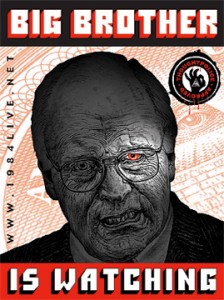When Pvt. Bradley Manning appeared in a military courtroom at Fort Meade, Maryland, last week, it was his first public appearance in more than 19 months. Manning has been held without trial for the past year and a half; only now is a hearing being conducted to determine if there is sufficient evidence to refer his case to a general court martial.
During this period, Manning, who is charged with transferring classified information to an unauthorized source, has been treated as an "enemy combatant," subjected to solitary confinement in a maximum-security cell as well as harassment day and night.
Manning's inhuman and degrading treatment clearly is designed as a warning to other individuals who might be considering the unauthorized release of classified information. There were periods in his pre-trial confinement when he was forced to stand naked, which conjures up images of Guantanamo and Abu Ghraib -- not U.S. justice.
At the current hearings, the government has even been allowed to exclude journalists from portions of the proceedings. The norms of the legal system, including military justice, have been observed in the breach, particularly the right to a speedy trial.
The documents leaked by Manning were an embarrassment to the United States, but not a threat to U.S. security. The overwhelming majority of the documents were governmental boilerplate.
The campaign to intimidate potential whistleblowers or dissidents within the government is consistent with the national security state that the Bush and Obama administrations have created over the past decade.
A new policy of domestic intelligence gathering has permitted not only law enforcement agencies, but intelligence agencies and the Pentagon to collect, store and analyze vast amounts of digital data on law-abiding U.S. citizens. Lawsuits that challenge improper eavesdropping have been met with challenges from the Department of Justice concerning "state secrecy" in order to prevent trials.
The Obama administration has resorted to the Espionage Act of 1917 and to state secrecy defense even more often than the Bush administration did.
The increase in domestic surveillance has often been illegal; the practice of warrantless eavesdropping has been unconstitutional. The FBI has wiretapped conversations between lawyers and defendants, challenging the legal principle that attorney-client communication is inviolate.
The FBI has been given the authority to issue secret National Security Letters without the review or approval of a judge or prosecutor. The letters are a form of administrative subpoena used to obtain records from "third parties," such as hotels, banks, phone companies, Internet providers and even libraries. Any transaction in digital data is subject to government collection.
The Plamegate Scandal
The government's campaign, including the treatment of Manning, to deter others from exposing sensitive and embarrassing information began with the outing of a clandestine intelligence operative, Valerie Plame.
This effort was led by Vice President Dick Cheney in 2003 and was designed to establish the precedent of discipline of the national security bureaucracy as well as to exercise total control over the release of information embarrassing to the Bush administration.
Plame's husband, Ambassador Joe Wilson, had traveled to Africa for the Central Intelligence Agency in February 2002 to investigate clandestine reports of a possible Iraqi effort to purchase uranium yellowcake. Also in early 2002, the Joint Chiefs of Staff and the Department of State sent high-level representatives to Africa to conduct similar investigations.
All three emissaries determined that there was no substance to intelligence reporting that Iraq was trying to buy uranium yellowcake from Niger. The intelligence community was not surprised because they knew the reports were part of a not-so-sophisticated forgery by members of the Italian military intelligence service.
However, since so-called Iraqi efforts to obtain weapons of mass destruction was the key to the Bush administration's invasion of Iraq in March 2003, Cheney was livid when Ambassador Wilson began to leak details of his Niger trip to Nicholas Kristof of the New York Times as well as to the Washington Post and the New Republic.
(Note: You can view every article as one long page if you sign up as an Advocate Member, or higher).





